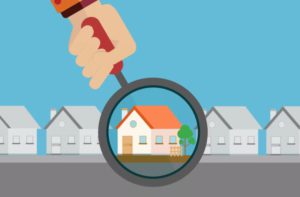It’s a common problem – how do you balance buying a home while selling the old one?
If it’s your own home that you’re putting on the market, the stakes are even higher.

You don’t want to be paying two mortgages, but you don’t want to be without a roof over your head either.
In a perfect world, the two transactions would line up seamlessly but even if you do manage to juggle the two contracts simultaneously, other problems can still arise.
Contracts can fall through, legal issues can delay settlement, or the other party may request an extension.
In today’s booming market, where FOMO is rife, people are making emotional decisions thinking the market is going to run away from them.
But the bonus here is that these buyers are able to bring a ‘trade in’ to the market and one that will increase in value during the time it takes to do the research for a new property.
Similarly downsizers will be in a good position as the value of their home will keep increasing more than the smaller dwelling or family-friendly apartment they may be considering moving to.
Unfortunately there is no right answer about what the best move is.
So it’s more important than ever to make sure you know all the pros and cons of each scenario before making a decision about whether you buy or sell your property first.
The pros and cons of selling a property first
This is widely considered to be the less risky and safer approach, but can also be less convenient.
The pros:
- Selling first is the less risky option.
- You avoid paying for two mortgages simultaneously or getting a bridging loan, saving money stress.
- Selling first means you’ll know exactly how much you can spend on your new property, giving you certainty of your budget
- Having the money ready and at your disposal is advantageous for decisive buyers.
- Having to move into temporary rental accommodation while you’re in the gap between properties can be advantageous and give you extra time to find the right property, particularly if you’re moving areas and don’t know the new area that well. It gives you a chance to ‘try before you buy’.
- If you manage to negotiate a longer settlement (90 days for example) you can give yourself more time to look for your next property.
The cons:
- Buyers who rely on the sale of their home to fund the new purchase have less flexibility than when buying first, increasing the pressure to sell by a firm date.
- These buyers are on a time constraint with pressure to find another property quickly.
- If you haven’t found or moved into your next home by settlement day you’ll need to move to temporary accommodation – which comes at a cost (rent and two moves) and also an inconvenience.
- If property prices are rising, there could be a large gap between the selling price of your sold property, and the purchase price of your next one, meaning you could risk being priced out of your ideal location or even be forced into buying something which isn’t quite right.
The pros and cons of buying a property first
This is potentially a riskier strategy, but also offers the advantages of giving you a better opportunity to find your ideal home and can work well in a seller’s market.
The pros:
- You can make the decision in your own time and at your own pace, rather than panic buying the first thing you see because you need somewhere to live fast. This means you can also buy your dream property if you find it, rather than miss out if the timing isn’t right.
- You won’t need to worry about renting short-term or staying in a hotel between settlements, which can be a major concern for young families or those who work from home.
- You can concentrate on getting a good sale for your previous property, without worrying about the extra stress of managing a sale while also managing a new purchase.
- You’ll have lower moving costs because you’ll only need to move once, rather than twice (it’s temporary accommodation and then into your next home).
- If house prices are rising quickly, you could potentially get a bargain on your next home, while letting the market upswing add to the value of your current home.
The cons:
- Buying first relies on you having a much stronger financial position – for many this isn’t an option as they rely on the sale of their old home to buy the new one. This is particularly the case for upgraders.
- It’s harder to secure a loan because you’re effectively applying for a mortgage approval while already have a mortgage.
- Bridging finance is available in some cases in this scenario, but rates for these loans are higher and the finance is contingent on the sale. Also, if your current home doesn’t sell quickly, this financial pressure could lead to you accepting a lower offer on your home.
- People who buy first could overestimate the selling price of their current home and find themselves in a financially difficult position on settlement of their existing home.
- It could take longer than you have estimated to sell your home, especially if it’s a slowing or buyer’s market. This can put pressure on you to sell your current property for far less than you would otherwise have accepted.
Is it a buyer’s or seller’s market?
Logic dictates that selling before buying the next property is the safest option, but it’s not always the wisest one.
 To know for sure what is the best move for you, besides taking into account all the pros and cons above, you have to investigate the state of the market, identifying whether it is a seller’s market or a buyer’s market.
To know for sure what is the best move for you, besides taking into account all the pros and cons above, you have to investigate the state of the market, identifying whether it is a seller’s market or a buyer’s market.
This, more than anything, can have a huge impact on your decision of whether to buy or sell first because if your home is likely to sell quickly, you’ll need a back-up plan in place to help you cope in between properties.
A seller’s market means that there are more buyers in the market than properties available.
In a seller’s market, buying first would be the best option as there are more buyers than there are houses for sale and your current home is more likely to sell quickly.
This is assuming that you’re buying and selling in the same market, area or even type of house (houses and apartments may have different markets for example).
That way, there’s less pressure to settle for anything less than what you want when you’re shopping for a new home, as you’ll be reasonably confident of getting a good price when you sell.
A buyer’s market means that selling first will help avoid having two properties on the go at once.

Typically, in a buyer’s market, the sensible approach is to sell your home first.
That’s because in this market there are more homes for sale than buyers and homes stay on the market longer.
So if you got into a situation where you couldn’t sell your home, you could be left juggling two home loans or paying bridging finance for an extended period.
That could get costly.
So whether or not you’re in a buyer’s market is only a real issue depending on your financial ability – but it’s a huge expenditure of money, especially if the process takes several months.
Selling first gives some wiggle room to hold off for the best price too, since you won’t have the deadline of another settlement looming.
The property markets around Australia are very fragmented, meaning that it’s not a one-size-fits-all answer.
 Some locations are clearly a buyer’s market but more and more locations in our capital cities are becoming seller’s markets with few good quality properties available for every property buyer out there.
Some locations are clearly a buyer’s market but more and more locations in our capital cities are becoming seller’s markets with few good quality properties available for every property buyer out there.
But there is a third scenario you could find yourself in.
Where the markets in the selling location and buying location are different, you could find yourself in an extra predicament.
In this case, it’s very important that you do your research and work out what the best approach is for you.
How to get it right
The key to success, whether you decide to buy or sell first, is in the way you’re able to manage both sides of the transaction.
You need to do this simultaneously, with as much focus on choosing an agent, pre-sale preparation and asset selection.
 Local market knowledge is invaluable, and can help upgraders decide which step to take first.
Local market knowledge is invaluable, and can help upgraders decide which step to take first.
As is getting advice from an excellent and experienced vendors advocate and/or a buyers’ agent such as the team here at Metropole.
Using the services of a buyer’s agent, for example, can help to source a new property quickly.
A proficient buyers’ agents can often find properties that aren’t even listed on the market yet (an off-market sale) and remove a lot of stress from the process overall.
from Property UpdateProperty Update https://propertyupdate.com.au/buy-or-sell-first-juggling-settlement-without-dropping-ball/
No comments:
Post a Comment